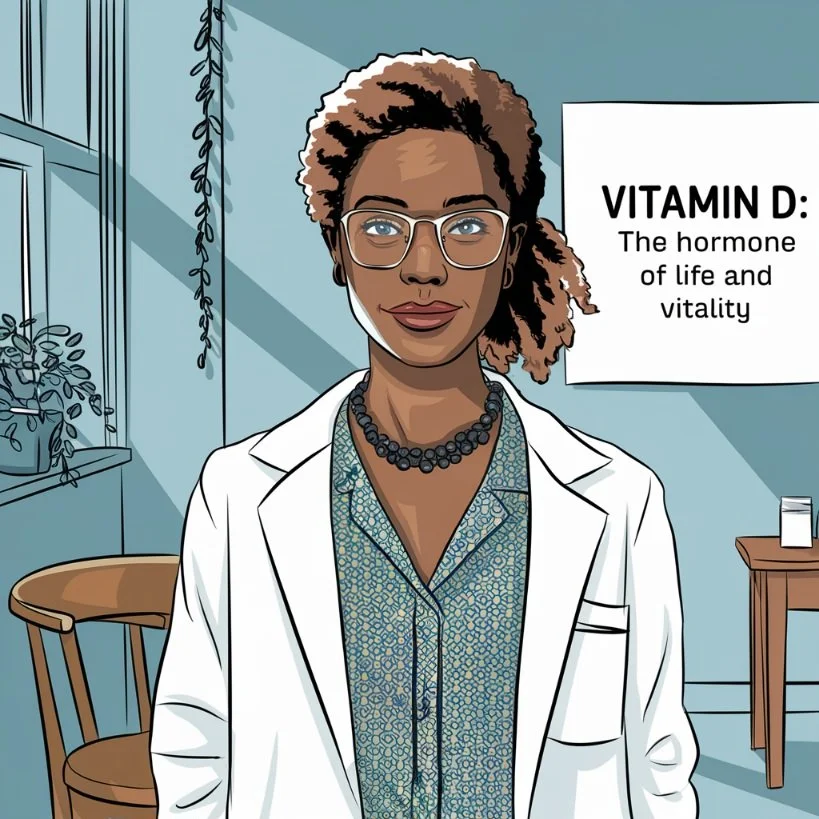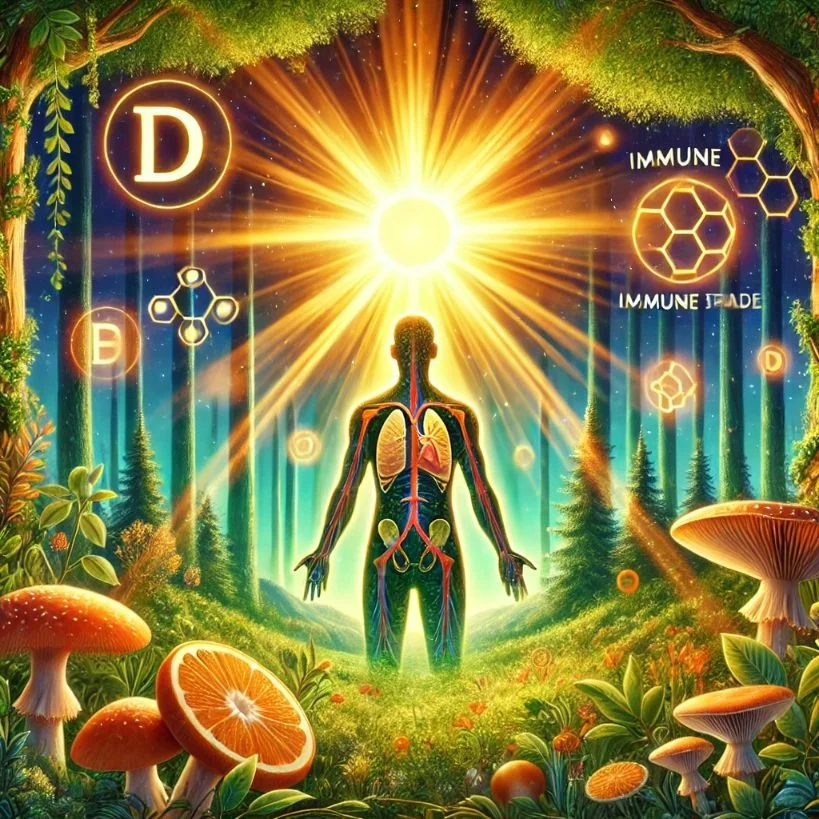Vitamin D: The Hormone of Life and Vitality
Vitamin D: The Hormone of Life and Vitality
Imagine a molecule so transformative it modulates over 150 genes, serves as a linchpin for immunity, fortifies your bones, balances hormones, and uplifts mental well-being. Often misunderstood as a mere vitamin, vitamin D functions as a hormone that is indispensable to human health. Its deficiency is a silent epidemic, exacerbating chronic illnesses, immune dysfunction, and hormonal imbalances globally. To fully grasp the depth of its impact and the steps to optimize it, let’s unravel the science and actionable insights behind this extraordinary nutrient.
Understanding Vitamin D Testing: Decoding Your Levels
Optimal health begins with understanding your vitamin D status, which requires precise testing. Here are the two pivotal tests that assess its presence in your body:
1. 25-Hydroxyvitamin D (25(OH)D)
Purpose: This measures the storage form of vitamin D in your bloodstream and is the gold standard for evaluating overall levels.
Conventional Range: 30.00–100.00 ng/mL (74.88–249.60 nmol/L).
Functional Medicine Range: 60.10–90.14 ng/mL (150–225 nmol/L).
2. 1,25-Dihydroxyvitamin D (Calcitriol)
Purpose: This test evaluates the active form of vitamin D. While useful, it may remain stable even during deficiencies, making it a secondary indicator.
Conventional Range: 18.00–72.00 pg/mL (43.20–172.80 pmol/L).
Functional Medicine Range: 35.00–55.00 pg/mL (84.00–132.00 pmol/L).
Key Takeaway: The 25(OH)D test is indispensable for ensuring adequate reserves to support immunity, hormonal harmony, and chronic disease prevention.
Why Vitamin D Matters: Beyond Bone Health
Vitamin D transcends its reputation as merely a bone-supporting nutrient. Its influence permeates every aspect of well-being:
Immune System: Activates T-cells and modulates inflammation, fortifying defenses against infections.
Hormonal Regulation: Balances estrogen and progesterone, aiding in conditions like menstrual irregularities and reducing risks such as fibroids.
Chronic Disease Prevention: Research links adequate vitamin D levels to reduced risks of autoimmune conditions such as, cardiovascular disease, and cancers.
Muscle and Bone Strength: Supports calcium absorption and reduces fracture risk.
Who is at Risk of Deficiency?
Certain demographics face heightened vulnerability to vitamin D insufficiency:
🫴🏾 People with Darker Skin: High melanin levels reduce UVB absorption, limiting natural vitamin D synthesis.
Solution: Regular testing and supplementation tailored to individual needs.
🫴🏾 Northern Latitude Residents: Limited UVB exposure during fall and winter increases risk.
Solution: Supplementation during low sunlight months is essential.
🫴🏾 Older Adults: Age-related decline in skin’s ability to produce vitamin D.
Solution: Increased dietary intake and supplementation.
🫴🏾 Genetically Predisposed Individuals: Variants in the GC gene (encoding vitamin D-binding protein) or VDR gene (vitamin D receptor) may impair activation and function.
Recommendation: Genetic testing to personalize supplementation and ensure functional optimization.
🫴🏾 Obese Individuals: Vitamin D is sequestered in fat tissue, making it less bioavailable.
Solution: Higher doses of supplementation under medical guidance.
Harnessing the Sun: Your Natural Vitamin D Source
Sunlight serves as nature’s most potent provider of vitamin D. Here’s how the process works:
🌿 UVB Rays Activate the Skin: Cholesterol in the skin converts to vitamin D3 upon sun exposure.
🌿 Liver and Kidneys Finalize Activation: These organs transform vitamin D3 into calcitriol, the hormone form.
🌿 Systemic Benefits: Calcitriol regulates calcium, enhances immunity, and fosters hormonal equilibrium.
Optimal Exposure: Aim for 10–30 minutes of direct sunlight on bare skin, 2–3 times weekly, between 10 a.m. and 3 p.m. Factors like sunscreen, clothing, and glass windows may necessitate supplementation.
Nourishment Through Whole Food Plant-Based Sources
For those embracing a plant-based lifestyle, dietary options for vitamin D include:
🌿 Mushrooms: Varieties exposed to UV light, such as maitake or portobello, contain vitamin D2.
🌿 Fortified Plant Milks: Almond, soy, or oat milk with added vitamin D.
🌿 Fortified Cereals: Look for organic and non-gmo whole-grain options.
While these can supplement intake, most individuals require additional vitamin D3 from lichen-based supplements for optimal health.
Fun Fact:
Did you know that vitamin D isn't just made in your skin? Mushrooms exposed to sunlight can produce vitamin D2, much like how human skin synthesizes vitamin D3 from UVB rays. This makes them one of the rare plant-based sources of this vital nutrient—perfect for those on a whole food plant-based diet!
Supplementation: Precision for Optimal Health
🫴🏾 Daily Needs: Functional medicine typically recommends 5,000–10,000 IU for adults, far exceeding conventional guidelines.
🫴🏾 Dosing by Age:
Infants: 400–1,000 IU/day.
Children: 1,000–2,000 IU/day.
Adults: 5,000–10,000 IU/day (based on individual requirements).
Note: Always consult with a practitioner to tailor supplementation to your unique needs, especially if you belong to a high-risk group.
Functional Medicine’s Elevated Standards: Optimizing Your Health
Functional medicine prioritizes prevention and vitality, advocating for vitamin D levels within a protective range of 60–90 ng/mL (150–225 nmol/L), surpassing the lower thresholds of conventional guidelines. This approach targets root causes and fosters long-term wellness.
Your Next Step: Reclaiming Your Vitality
Vitamin D is not just a nutrient; it is a cornerstone of health and longevity. By understanding your status, addressing insufficiencies, and leveraging sunlight, food, and targeted supplementation, you can unlock its full potential.
Are you ready to transform your health? Contact us to start with a personalized assessment and take the first step toward vibrant living today.
“Invest in your health, invest in you, because a healthier lifestyle is a luxury you deserve!”
Reference
https://townsendletter.com/vitamin-d-scientific-american-chimes-in-on-vital-as-research-money-vanishes/
https://youtu.be/uAfVC4l5uZ0?si=qXIOdLMK_rservlz
https://youtu.be/y0Wj0kU4-KQ?si=uPN2kUZUez5gLMjc
https://youtu.be/NZI8qJjN2Qw?si=BfOiOnNjpcx9yIyy
https://youtu.be/QAQ7r6jLEww?si=MCTJt9CtFnGYqlE6
https://en.wikipedia.org/wiki/Vitamin_d
https://www.ncbi.nlm.nih.gov/books/NBK278935/
https://www.naturopathy-uk.com/news/news-cnm-blog/blog/2021/06/23/why-is-vitamin-d-important/
https://www.news-medical.net/health/The-Role-of-Vitamin-D-in-Hormonal-Balance.aspx
https://www.evergreen-life.co.uk/health-wellbeing-library/vitamin-d-gateway-to-good-health/
https://www.yourhormones.info/hormones/vitamin-d/
https://adesawell.com/post/optimal-vitamin-d-levels-a-functional-medicine-approach
https://www.pharmacytimes.com/view/vitamin-d-is-the-new-hormone
https://www.vitacost.com/blog/why-is-vitamin-d-important/
https://www.medicalnewstoday.com/articles/161618
DISCLAIMER: The health information in this blog is for general education and is not intended to substitute for any medical advice. No medical cure, diagnosis, or treatment is provided.
This website contains affiliate links, which means LTL may receive a percentage of any product or service you purchase using the links in the items descriptions, articles or advertisements. You will pay the same price for all products and services, and your purchase helps support our ongoing effort in assisting you. Thanks for your support!
✨ Unlock expert wellness insights! 🌿 Subscribe now for exclusive health tips & natural living secrets! 🌱💪🏾


